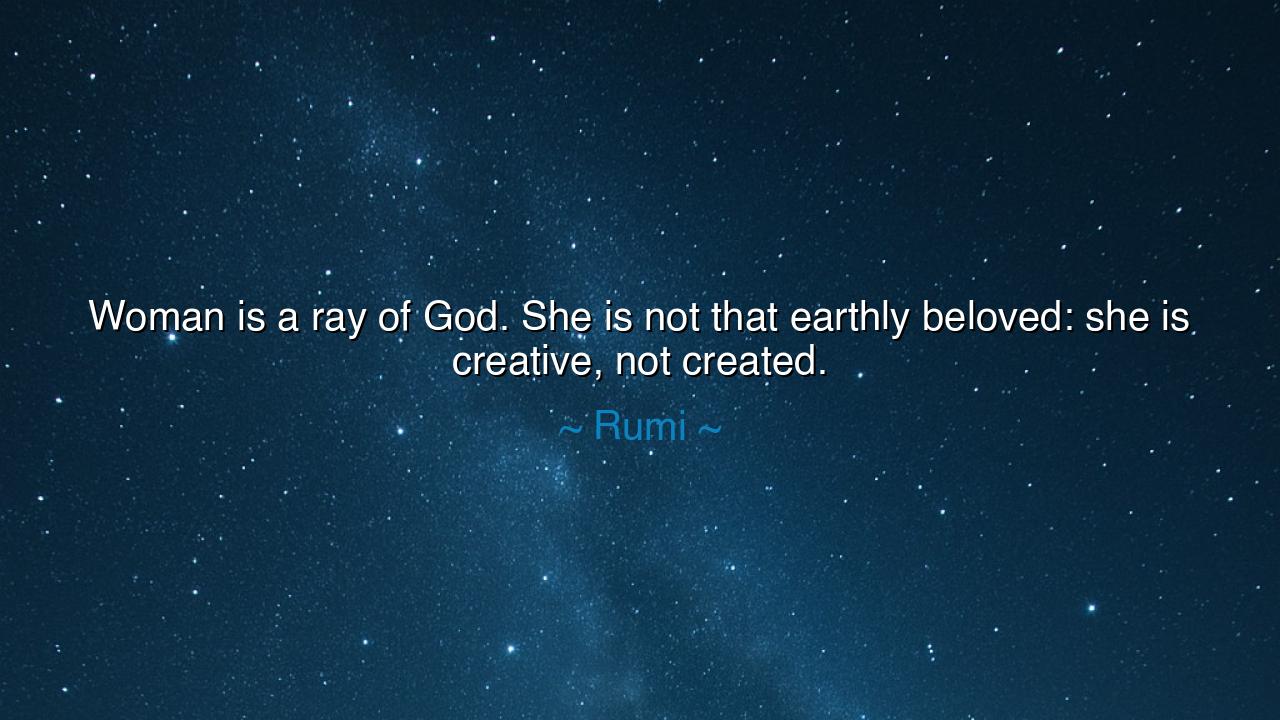
Woman is a ray of God. She is not that earthly beloved: she is






“Woman is a ray of God. She is not that earthly beloved: she is creative, not created.” — Thus wrote Jalal al-Din Rumi, the mystic poet of the soul, whose words bridged heaven and earth, flesh and spirit. In this divine utterance, Rumi lifts woman beyond the dust of worldly perception and reveals her as a vessel of divine light, a reflection of the Creator’s own power to give life, nurture, and transform. To those who saw woman as fragile or lesser, he spoke as a prophet of balance, proclaiming that she is not the shadow of man, but a ray of God Himself, bearing within her the sacred fire of creation.
The meaning of this quote transcends the boundaries of gender and enters the realm of the eternal. When Rumi says that woman is “creative, not created,” he is not denying her humanity, but awakening the awareness that she embodies the divine principle of creation. In his mystical vision, woman is not merely born into the world—she brings the world into being. She is the mirror through which God’s love becomes tangible, the breath through which life is renewed. Her existence is not derivative of man, as some traditions have claimed, but an independent manifestation of the creative power of the Divine. Just as the sun sends out its rays, God sends forth woman to illuminate the earth with compassion, beauty, and life.
The origin of these words lies in the Sufi tradition from which Rumi spoke — a tradition that sees all creation as a reflection of God’s infinite attributes. To the Sufi, every being is a sign pointing back to the Divine, but among all, woman is unique. She embodies the mercy and mystery of God, the nurturing love through which life flourishes. Rumi’s teacher, Shams of Tabriz, had taught him that love is the bridge between the human and the divine, and woman — as the symbol of love, birth, and beauty — stands at that sacred intersection. In calling woman a “ray of God,” Rumi shattered the boundaries of his time, affirming that to love and honor the feminine is to love and honor the face of God.
To grasp this truth more deeply, consider the life of Mary, the mother of Jesus, who stands in many faiths as the archetype of divine womanhood. In her humility and strength, she did not create from power, but from surrender — and through her came the incarnation of divine mercy. She bore pain, yet from her pain flowed salvation. Rumi’s words could well have been written for her: she was not merely created by God; she became the vessel through which God created anew. Her motherhood was not of the body alone, but of the spirit — a reminder that the creative essence of womanhood lies not merely in bearing life, but in nurturing the divine spark within all creation.
But Rumi’s message extends far beyond motherhood. It speaks of creativity in every form — of art, wisdom, love, and healing. Wherever there is creation that uplifts the soul, there the feminine principle of divinity moves. The poet, the healer, the teacher, the visionary — all partake in this ray of God when they bring beauty out of chaos and compassion out of pain. Thus, the feminine is not bound to gender; it is the spiritual energy that gives birth to hope in a world of despair, that nourishes the hungry heart, that forgives where reason would condemn. To honor the divine feminine is to honor the source of life itself.
In Rumi’s age, when many saw woman as subordinate, these words were revolutionary. They overturned centuries of blindness and whispered the eternal truth that the soul has no gender. For in the eyes of God, both man and woman are instruments of divine expression, yet the feminine holds the power of renewal — the soft strength that brings balance to creation’s fire. Rumi, ever the lover of love, saw in woman not the weakness of flesh but the majesty of spirit — the same divine breath that moved over the waters at the dawn of time.
Therefore, my children, take this teaching to heart: honor the divine ray within every woman, and within yourself, if you bear the spirit of creation. Do not mistake gentleness for weakness, nor nurturing for servitude. The strength of woman is not in domination but in transformation — in her power to turn suffering into wisdom, emptiness into abundance, and hatred into love. To honor her is to honor the creative heart of God.
And so, remember Rumi’s eternal vision: “Woman is a ray of God.” See her not as created, but as creative; not as a possession, but as a partner in the dance of creation. In every mother, artist, teacher, and healer, recognize the spark of the divine. Let your reverence for her light shape the way you see the world, for to walk in harmony with the feminine is to walk in harmony with God Himself. For where she stands, creation begins anew — and the divine breathes once more through the beauty of the human soul.






AAdministratorAdministrator
Welcome, honored guests. Please leave a comment, we will respond soon